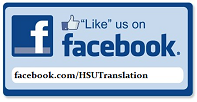Programme Objectives (MA-TCAT)
Programme Objectives
The Master of Arts in Translation (Computer-Aided Translation) Programme aims to provide academic and professional training for potential language professionals to help them become competent in computer-aided translation (CAT) in the era of artificial intelligence and big data.
Students can acquire professional translation skills and get hands-on experience with translation technology, and they will be in a better position to provide quality language services (e.g., translation, localisation, and bilingual writing and editing) with the assistance of state-of-the-art language technology.
Programme Intended Learning Outcomes (PILOs)
Upon successful completion of this programme, students should be able to:
- Apply highly specialised technical know-how and conceptual skills to formulate solutions to professional language services with translation technology;
- Conduct research on complex issues relating to translation technology and professional language services;
- Reflect critically on the multifaceted issues and practice relating to translation technology and professional language services;
- Utilise and extend a wide spectrum of skills and knowledge of translation technology to enhance the efficiency and effectiveness of professional language services; and
- Communicate effectively in English and Chinese in a broad range of professional activities and for research and study purposes.
Employment Pathways
Graduates of the Programme will have a wide range of career options:
- Professional translators
- Professional language service providers
- Project managers
- Terminologists
- Translation application developers
- Technical writers
- Public relations officers
- Communication officers
- Language trainers
- Language teachers

